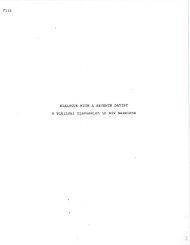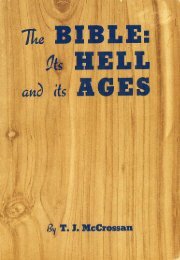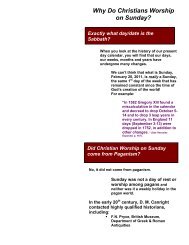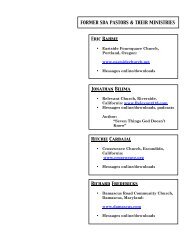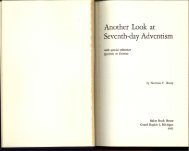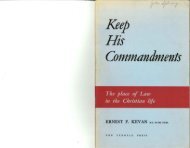Discovering the New Covenant by Greg Taylor - exAdventist Outreach
Discovering the New Covenant by Greg Taylor - exAdventist Outreach
Discovering the New Covenant by Greg Taylor - exAdventist Outreach
You also want an ePaper? Increase the reach of your titles
YUMPU automatically turns print PDFs into web optimized ePapers that Google loves.
SABBATH IN THE OLD TESTAMENT<br />
of life during those years. But <strong>the</strong>re is no mention of <strong>the</strong><br />
Sabbath for 2500 years! It is highly unlikely that <strong>the</strong><br />
Sabbath would never have been mentioned during this time<br />
if it truly was established at Creation. What I learned from<br />
a closer examination of <strong>the</strong> Creation account is that <strong>the</strong><br />
Creation ordinance idea has some serious weaknesses. So if<br />
I was going to be faithful to what <strong>the</strong> text actually says, I<br />
had to admit that two interpretations are feasible: 1) a<br />
Creation ordinance of a seventh-day Sabbath, or 2) a<br />
completed work and celebration that was intended to affect<br />
<strong>the</strong> world for every day <strong>the</strong>reafter. The latter meaning<br />
would indicate that God never intended for humans to toil<br />
in hardship to make it in life. There was to be a perpetual<br />
state of rest in unbroken relationship with <strong>the</strong> Creator.<br />
We do not find Sabbath mentioned again until Exodus<br />
16:23. God explains <strong>the</strong> Sabbath concept to <strong>the</strong> people of<br />
Israel through <strong>the</strong> manna experience. As I studied, it<br />
became evident that <strong>the</strong> people were unaware of any<br />
Sabbath up to this time. They had been given some new<br />
commandments, such as <strong>the</strong> sacrifice of <strong>the</strong> lamb in Exodus<br />
12, and <strong>the</strong> institution of <strong>the</strong> Passover feast in <strong>the</strong> same<br />
time period. They knew about circumcision, but <strong>the</strong>y had<br />
not yet been introduced to <strong>the</strong> Sabbath. The context is clear<br />
that <strong>the</strong> people had to be taught about <strong>the</strong> Sabbath.<br />
The Sabbath is later expanded into one of <strong>the</strong> Ten<br />
Commandments in Exodus 20:8-11. There <strong>the</strong>y were<br />
instructed to remember <strong>the</strong> Sabbath. Some have suggested<br />
that this refers to Creation establishment, o<strong>the</strong>rs that it<br />
refers to <strong>the</strong> manna episode. Ei<strong>the</strong>r interpretation is feasible<br />
in <strong>the</strong> text. Notice that those who were obligated to rest<br />
included “<strong>the</strong> stranger within your gates,” a different group<br />
from <strong>the</strong> “stranger that sojourns among you” in Leviticus<br />
17-18. This command was not for everyone as a Creation<br />
ordinance might indicate. (See comments on Acts 15 in <strong>the</strong><br />
previous chapter.) Finally, verse 11 reads:<br />
115



